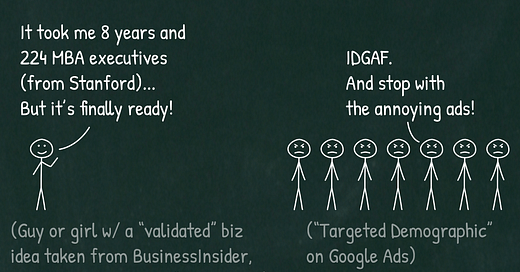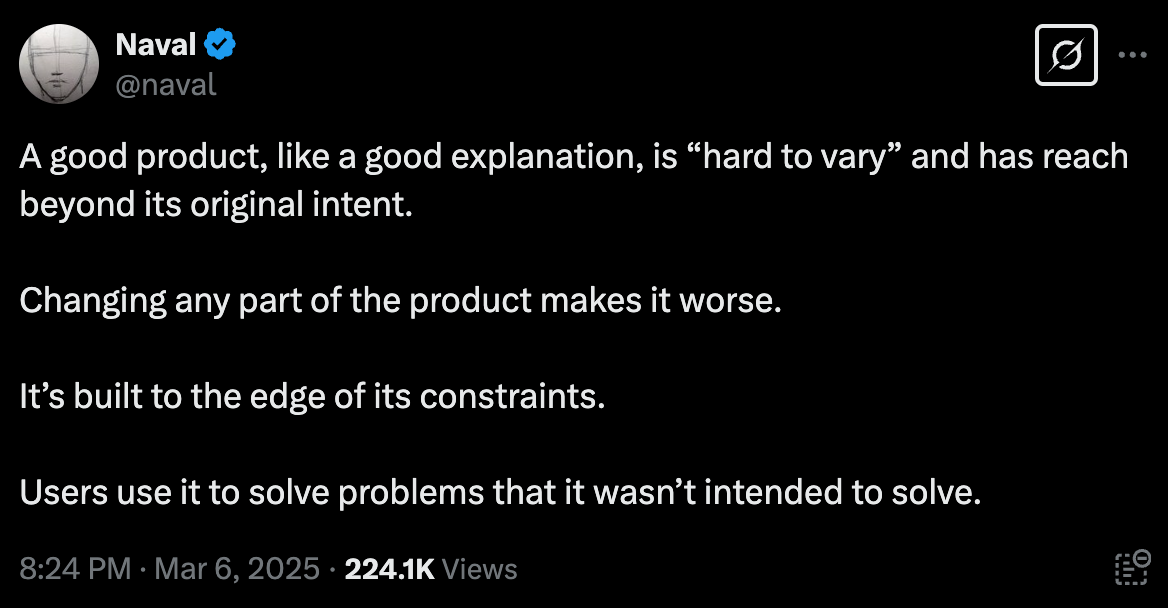What an Entrepreneur NEEDS to Understand about Free Market Capitalism
Nugget by Rory Sutherland and Naval Ravikant
👋 Hey friend
I know… it’s not Friday.
I decided to change the day because Substack (the platform that delivers the emails) has been reviewing my last import of emails (from my ebook) and it took longer than expected!
Hence, I send it today…
Today’s letter is a nugget I picked from the book Alchemy (written by Rory Sutherland) back in December 2024 — while I was traveling across 🇹🇭 Thailand and exploring nice Cafes to drink ☕️ americanos and 📚 read!
But I was sooo hooked into Alchemy that most of my reading time was on this book.
It was first recommended to me by my friend Jeremy Finger, and then I saw this comment from Nassim Nicholas Taleb on the cover of the book:
“A breakthrough book. Wonderfully applicable to everything in life, and funny as hell”
(Nassim and Rory are actually good friends)
Naval Ravikant has also referenced Rory here.
And on top of that… Rory is the Vice Chairman of Ogilvy and Mather — a company founded by the great David Ogilvy (whom Warren Buffet called a “genius”).
After connecting all these dots, I plunged into this book with an unprecedented level of excitement I’ve ever had for a book! And it actually far exceeded my high expectations!!
👤 Doers
💡Nugget
🟠 Rory Sutherland:
It is a never-mentioned, slightly embarrassing but nevertheless essential facet of free market capitalism that it does not care about reasons – in fact it will often reward lucky idiots. You can be a certifiable lunatic with an IQ of 80, but if you stumble blindly on an underserved market niche at the right moment, you will be handsomely rewarded. Equally you can have all the MBAs money can buy and, if you launch your genius idea a year too late (or too early), you will fail.
To people who see intelligence as the highest virtue, this all seems hopelessly unmeritocratic, but that’s what makes markets so brilliant: they are happy to reward and fund the necessary, regardless of the quality of reasoning. Perhaps people don’t ‘deserve’ to be rewarded for being lucky, but a system that did not ensure the survival of lucky accidents would lose most of its value. Evolutionary progress, after all, is the product of lucky accidents. Similarly, a system of business that kept empty restaurants, say, open through subsidy, simply because there seemed to be some good reasons for their continued existence, would not lead to happy outcomes.
The theory is that free markets are principally about maximising efficiency, but in truth, free markets are not efficient at all. Admiring capitalism for its efficiency is like admiring Bob Dylan for his singing voice: it is to hold a healthy opinion for an entirely ridiculous reason. The market mechanism is loosely efficient, but the idea that efficiency is its main virtue is surely wrong, because competition is highly inefficient. Where I live, I can buy groceries from about eight different places; I’m sure it would be much more ‘efficient’ if Waitrose, M&S, Lidl and the rest were merged into one huge ‘Great Grocery Hall of The People’.
The missing metric here is semi-random variation. Truly free markets trade efficiency for market-tested innovation that is heavily reliant on luck. The reason this inefficient process is necessary is because most of the achievements of consumer capitalism were never planned and are explicable only in retrospect, if at all. For instance, very few companies ever tested the effects of offshoring their call centre operations to countries with low labour costs – it simply became the fashionable thing to do, such was the level of enthusiasm for cost-reduction.
👉 Source: Alchemy, by Rory Sutherland
So... It's all about luck then?
I think if we see it on an individual-project basis (looking at a single project), luck plays a big role.
But luck's role decreases as the total number of projects increases (and you keep learning and adapting).
Over a long enough period of time (and enough projects), luck plays a significantly lower role in the entrepreneur's success! (maybe even an insignificant role!)🟠 Naval Ravikant & Scott Adams:
[Scott Adams]:
“You’ve probably seen more entrepreneurs before and after success than just about anybody ever gets to see, just from your vantage point.
Of all the people who made it, how many could you tell five minutes after you met them? Like, ‘Oh, this one’s gonna make it.’ And it doesn’t even sort of matter what the idea was, or…”
[Naval Ravikant]:
“So, it’s hard to tell which business is gonna work, because a lot of businesses fail, and a lot of good entrepreneurs chasing not-so-good businesses fail.
But the entrepreneurs themselves don’t fail.
Over a long enough period of time, when you meet the right entrepreneur, you know they’re gonna be a winner. They will be a winner. It’s just a question of how many times. You just had to back them a few times.”
👉 Source
I first picked this nugget on December 2024.
And now (March 2025) I revisited it on my personal notebook of nuggets.
Yes, I save all these timeless nuggets on a Notebook!
And you can also get access to it by clicking here
💥 Stuff I Loved
This one is a video on X, but super recommended! I’m reading Dr. Casey Means’s book Good Energy and it’s mindblowingly interesting and useful!
Taking a lot of notes on this one!
Talk you soon,
Julio :)
















Great and comprehensive coverage, thank you! Appreciate a lot also the shoutout! Glad!
Have a great day!